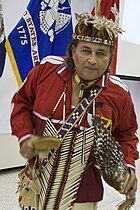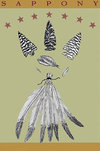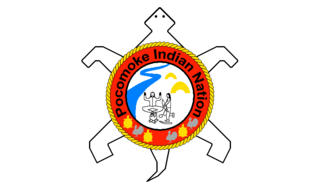State-recognition

The Commonwealth of Virginia recognized the Cheroenhaka (Nottoway) Indian Tribe as a tribe in 2010, when the state also recognized the Nottoway Indian Tribe of Virginia. [4]
| Named after | Nottoway people |
|---|---|
| Type | state-recognized tribe, nonprofit organization |
| EIN 34-2005753 [1] | |
| Purpose | A23: Cultural, Ethnic Awareness [1] |
| Location | |
Chairman | Walter D. Brown [1] |
Revenue (2020) | $30,957 [1] |
| Expenses (2020) | $12,815 [1] |
| Funding | grants, contributions [1] |
Staff (2020) | 0 [1] |
| Website | www |
The Cheroenhaka (Nottoway) Indian Tribe is a state-recognized tribe and nonprofit organization in Virginia. [2] The organization identifies as descending from Nottoway people. They are not federally recognized as a Native American tribe. [2]
The name Cheroenhaka is the autonym for Nottoway people. [3]

The Commonwealth of Virginia recognized the Cheroenhaka (Nottoway) Indian Tribe as a tribe in 2010, when the state also recognized the Nottoway Indian Tribe of Virginia. [4]
The group formed Cheroenhaka (Nottoway) Indian Tribal Heritage Foundation, a 501(c)(3) nonprofit organization in 2005, with the mission to "Educational, charitable and religious. Educational, charitable, and religious." [1] In 2020, the nonprofit held $468,180 in assets and hiring no employees. [1]
The chief is Walter "Red Halk" Brown of Courtland, Virginia. [5]
State-recognized tribes in the United States are organizations that identify as Native American tribes or heritage groups that do not meet the criteria for federally recognized Indian tribes but have been recognized by a process established under assorted state government laws for varying purposes or by governor's executive orders. State recognition does not dictate whether or not they are recognized as Native American tribes by continually existing tribal nations.

The Haliwa-Saponi Indian Tribe, also the Haliwa-Saponi Tribe, is a state-recognized tribe and nonprofit organization in North Carolina. They are not federally recognized as a Native American tribe.
The Monacan Indian Nation is one of eleven Native American tribes recognized since the late 20th century by the U.S. Commonwealth of Virginia. In January 2018, the United States Congress passed an act to provide federal recognition as tribes to the Monacan and five other tribes in Virginia. They had earlier been so disrupted by land loss, warfare, intermarriage, and discrimination that the main society believed they no longer were "Indians". However, the Monacans reorganized and asserted their culture.
The Chickahominy are a federally recognized tribe of Virginian Native Americans who primarily live in Charles City County, located along the James River midway between Richmond and Williamsburg in the Commonwealth of Virginia. This area of the Tidewater is not far from where they were living in 1600, before the arrival of colonists from England. They were officially recognized by the state in 1983 and by the federal government in January 2018.

The Native American tribes in Virginia are the indigenous tribes who currently live or have historically lived in what is now the Commonwealth of Virginia in the United States of America.
The Nansemond are the Indigenous people of the Nansemond River, a 20-mile-long tributary of the James River in Virginia. Nansemond people lived in settlements on both sides of the Nansemond River where they fished, harvested oysters, hunted, and farmed in fertile soil. Today, Nansemond people belong to the federally recognized Nansemond Indian Nation.

The Mattaponi tribe is one of only two Virginia Indian tribes in the Commonwealth of Virginia that owns reservation land, which it has held since the colonial era. The larger Mattaponi Indian Tribe lives in King William County on the reservation, which stretches along the borders of the Mattaponi River, near West Point, Virginia.

The Nottoway are an Iroquoian Native American tribe in Virginia. The Nottoway spoke a Nottoway language in the Iroquoian language family.
The Nulhegan Band of the Coosuk Abenaki Nation is a state-recognized tribe and nonprofit organization, called AHA "Abenaki Helping Abenaki", whose headquarters and land are based in Vermont. They are often referred to as the Nulhegan Abenaki Tribe or simply, Nulhegan.

The Ridgetop Shawnee Tribe of Indians is a limited liability company, nonprofit organization, and unrecognized tribe in Kentucky. They are Americans who identify as being of Shawnee ancestry.

Nottoway, also called Cheroenhaka, was a language spoken by the Nottoway people. Nottoway is closely related to Tuscarora within the Iroquoian language family. Two tribes of Nottoway are recognized by the state of Virginia: the Nottoway Indian Tribe of Virginia and the Cheroenhaka (Nottoway) Indian Tribe. Other Nottoway descendants live in Wisconsin and Canada, where some of their ancestors fled in the 18th century. The last known speaker, Edith Turner, died in 1838. The Nottoway people are undertaking work for language revival.

The Echota Cherokee Tribe of Alabama is a state-recognized tribe in Alabama and Cherokee heritage group. It is based in northern Alabama and gained state-recognition under the Davis-Strong Act in 1984.
The Washington Redskins Original Americans Foundation was a nonprofit organization started by Daniel Snyder, controlling owner of the Washington Redskins football team. It was formed in 2014 under a climate of controversy around the name of the team, which Native American organizations such as the National Congress of American Indians consider offensive. According to a letter from Snyder, it "will address the urgent challenges plaguing Indian country based on what tribal leaders tell us they need most." In the letter to season ticket holders, announcing the Foundation, Snyder stated that he and other team representatives had visited 26 reservations in twenty states to "listen and learn first-hand about the views, attitudes, and experiences of the Tribes". The letter quotes Pueblo of Zuni Governor Arlen Quetawki, saying "I appreciated your sincerity to learn about our culture and the real life issues we face on a daily basis". Torrez-Martinez of Desert Cahuilla was quoted in the letter as saying, "There are Native Americans everywhere that 100 percent support the Redskins". Snyder also used his letter to cite instances of support for the team name by other Native Americans during his visits.

The Sappony are a state-recognized tribe in North Carolina. They claim descent from the historic Saponi people, an Eastern Siouan language-speaking tribe who occupied the Piedmont of North Carolina and Virginia.
The Nottoway Indian Tribe of Virginia is a state-recognized tribe and nonprofit organization in Virginia. The organization identifies as descending from Nottoway people. They are not federally recognized as a Native American tribe.
The Accohannock Indian Tribe, Inc. is a state-recognized tribe in Maryland and a nonprofit organization of individuals who identify as descendants of the Accohannock people.
The Patawomeck Indian Tribe of Virginia is a state-recognized tribe in Virginia and a nonprofit organization of individuals who identify as descendants of the Patawomeck people.

The Natchez Indian Tribe of South Carolina or Eastern Band of Natchez is a nonprofit organization and "state-recognized group" not to be confused with a state-recognized tribe. The state of South Carolina gave them the state-recognized group and special interest organization designation under the SC Code Section 1-31-40 (A) (7)(10), Statutory Authority Chapter 139 (100-111) in 2007.
The Herring Pond Wampanoag Tribe is a cultural heritage group that claims descent from the Wampanoag people based in Plymouth, Massachusetts. They have a nonprofit organization, the Herring Pond Wampanoag Tribal Council, Inc.

The Pocomoke Indian Nation is a cultural heritage organization of individuals who identify as descendants of the Pocomoke people. They formed a nonprofit organization, the Pocomoke Indian Nation, Inc., in Eden, Maryland.